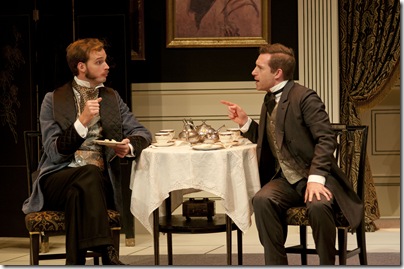Importance of Being Earnest at the NAC. Dykstra fails to Respect Wilde.
Photo: Andree Lanthier
Alert for Ted Dykstra: The Importance of Being Earnest is a social satire. It is NOT a farce. One of the key aspects of Oscar Wilde’s brilliant comedy is that it appears to observe the social niceties while subtly undercutting them.
Therefore, bun fights are more than wildly inappropriate. Having the two male leads throwing muffins across the stage at each other violates the playwright’s intent.
It is also completely out of place to have Miss Prism, the spinster governess, fondling the spout of a watering can in pseudo-sexual titillation, while panting after the bachelor vicar. Certainly, Wilde suggests that she longs to be married and he is the nearest eligible bachelor. But in the context of Earnest, they will always behave with complete propriety.
Equally out of tune with the style of social satire in general and Wilde in particular are such directorial inserts as having Jack Worthing enter with a somersault on to the nearest chesterfield or the gratingly silly business of having the butler blow a farewell kiss at Jack after an unnecessarily repetitive exchange of air kisses between Gwendolen and Jack.
The accumulation of wrong turns, from the horrors of the farcical approach to the relative sparseness of the sets — Oscar Wilde (1854-1900) lived in the Victorian era and Earnest was written in 1895 — the mosque-like shapes behind the ugly garden topiary and the presumably intentional errors in serving by the two over-played butlers screams insult to one of the cleverest and most amusing plays in the English language.
But it is definitely not amusing to see the charm of this oft-performed classic ground underfoot by so many faulty directorial decisions. Occasional plusses, such as the quality of Leigh Ann Vardy’s lighting design, Patrick Clark’s attractive costume design and Creighton Doane’s pleasant musical interludes do not make up for the generally negative impression of the wrong-headed approach.
The irritating voice that Lois Anderson is required to adopt as Miss Prism makes it extremely difficult to judge whether she could have presented a more credible characterization. The physical tantrums Christopher Morris is directed to deliver is so out of step with Victorian social etiquette that it is hard to know whether he might present a smoother version of Jack Worthing on another occasion.
Only Natasha Greenblatt as Cecily, Jack’s ward, gives a totally believable performance because she maintains the simplicity and charm her character requires. However, the famous altercation between Gwendolen (Amy Matsio) and Cecily is rocky because Matsio comes too close to losing her cool. Again, this may have been at the director’s urging.
Alex McCooeye, as Algernon, and Karen Robinson, as Lady Bracknell, demonstrate a clear understanding of the style and dignity their roles require, but they are fighting a losing battle in one of the least appealing attempts of a production of The Importance of Being Earnest that I have ever been unfortunate enough to witness.
Director: Ted Dykstra
Set and costumes: Patrick Clark
Lighting: Leigh Ann Vardy
Composer/Sound; Creighton Doane
Cats:
Miss Prism…………………………………………….Lois Anderson
Lane……………………………………………………Herbie Barnes
Cecily…………………………………………………..Natasha Greenblatt
Gwendolen……………………………………………..Amy Matsio
Algernon……………………………………………….Alex McCooeye
Rev. Canon Chasuble………………………………….Andrew Moodie
Jack…………………………………………………….Christopher Morris
Lady Bracknell…………………………………………Karen Robinson
Merriman……………………………………………….David Warburton
